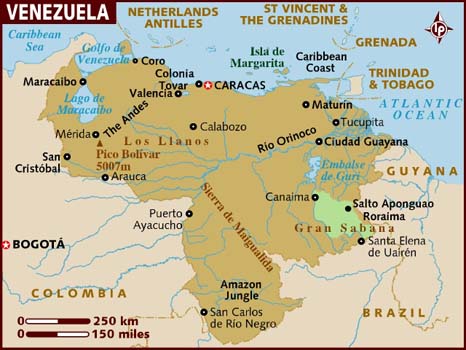Venezuela update
March 5, 2019 | Expert Insights
The US is discussing emergency aid for Venezuela, should the regime of Nicolás Maduro fall, including potential financial assistance alongside official loan programmes from the IMF and other institutions. NSA John Bolton has clarified the US’ position as seeking “complete regime change” in the country.
Background
The Bolivarian Republic of Venezuela is located in the North West region of South America. In 2017, the UN estimated that the country is home to over 31 million people. The country stretches across over 900,000 square kilometres. It is bordered by the Caribbean Sea in the north, and Columbia, Guyana, and Brazil in the west, east, and south respectively. Venezuela was colonised by Spain in 1522 and became the first Spanish territory to declare independence from the empire in 1811.
Despite having the world’s largest oil deposits, many Venezuelans live in abject poverty. The former President Hugo Chavez, was in office from 1999 to 2013, during which time billions of dollars were spent on generous social programs. However, since his successor Nicolas Maduro took office, there has been a rise in inflation and a shortage of basic goods. A drop in oil price has added to the administration’s problems.
The UN says 1.6 million Venezuelans have fled the economic meltdown in the country since 2015, which has been hit by shortages of basic necessities such as food and medicine.

Analysis
With opposition leader Juan Guaidó touring South America, Trump administration officials have been quietly planning for the chaotic situation that would probably follow any change of regime — even as the US continues to implement tough oil sanctions designed to starve the Maduro government of foreign revenue.
Among the key questions is - what aid the Trump administration will itself offer (potentially requiring Congressional authorisation) to sustain a new Guaidó government in the initial months before global lenders such as the IMF are able to introduce their own full-blown programmes. Emergency aid worth billions of dollars might be needed from the international community in the early months to stem a humanitarian crisis that has already led to 3.5m refugees fleeing the country. The US’s ability to muster global support for a rescue package, both in the short and long term, would be crucial to the country’s fate in a democratic transition. The stabilisation effort would have to be very well financed and well executed, Bolton added, because “you only get one good shot to stop hyperinflation [situation] and there are some important choices to make. . . The international community needs to be ready to support economic stabilisation and recovery.”
Mismanagement and corruption have caused Venezuela’s hyperinflationary economy to halve in size, in the past five years in what has turned out to be the hemisphere’s biggest ever economic collapse. Accelerating the decline are US energy sanctions that could halve oil exports this year to $14bn. Additionally, National Security Adviser John Bolton said that the United States will form “as broad a coalition” as possible to oust Venezuelan President Nicolas Maduro. Bolton went on to call for a “completely democratic hemisphere.”
Bolton said that the US is not afraid to go it alone. “In this administration, we’re not afraid to use the phrase ‘Monroe Doctrine,’” he said. “This is a country in our hemisphere and it’s been the objective of American presidents going back to Ronald Reagan to have a completely Democratic hemisphere.”
The ‘Monroe Doctrine’ was the name given to the US policy of opposing European influence in the Western hemisphere, outlined by President James Monroe in 1823. Since then it has been invoked by John F. Kennedy and Ronald Reagan to oppose the spread of Communism to Cuba.
Russia’s foreign minister Sergei Lavrov said that Moscow was ready to begin bilateral talks with the US over Venezuela, while insisting that “only Venezuelans have the right to determine their future”. Russia, which has loaned Venezuela more than $17bn since 2006, has refused to recognise Mr. Guaidó and remains one of the main backers of Mr. Maduro’s government, along with China and Turkey.
Russia this week said it would ship more medical supplies and wheat to Caracas following a meeting in Moscow between Mr. Lavrov and Venezuelan vice-president Delcy Rodriguez. Mr Lavrov also “condemned American threats” the Maduro regime, calling it “open interference into the affairs of a sovereign state and a flagrant violation of international law”.
Assessment
Our assessment is that with the UNSC stalemate over Venezuela, there is no way to resolve this situation without the involvement of the Maduro-led and the Guaido-led factions for a multi-party negotiation. We believe that the Venezuelan people ultimately have the sole right to decide the future and as representatives of them, both Maduro and Guaido have to be involved in the discussions.
Read more:
Image courtesy: Miguel Discart (https://commons.wikimedia.org/wiki/File:Trump_2017-05-24_17-17-35_ILCE-6500_DSC00554_(34495951830).jpg), „Trump 2017-05-24 17-17-35 ILCE-6500 DSC00554 (34495951830)“, https://creativecommons.org/licenses/by-sa/2.0/legalcode








Comments